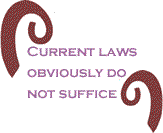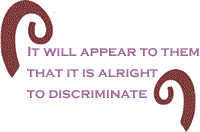When
a child commits suicide because of something that happens
in school - bullying or harassment - it�s past time to do
something about it. And we�ve had not just one or two, but
many across the country that we know about.
Before
the New York State Senate this week was a bill called the
Dignity for All Students Act and its aim was to stop the
kind of soul-killing fear that too many children experience
every day because of aspects of their personalities, including
sexual orientation and gender identification, that other
students lock onto and use as the basis of relentless harassment
of the child who has become just an object to the crowd.

According
to the New York Civil Liberties Union, New York is one of
eight states that don�t have such protection for school
children and, the group says, the bill would be �an essential
first step to stopping bullying and building a culture of
respect and understanding in our schools.�
S.
1987 would have provided training and tools for educators
and students and it would have mandated the reporting of
bias incidents and would have held schools accountable for
the behavior of children who harass and intimidate others.
The
Assembly had passed a similar bill - and had passed it for
three years - and had been awaiting the Senate�s action
on its bill. For now, vulnerable children will have to wait
for action by that house at some future time.
There
is little excuse for such inaction, considering the Assembly�s
wide margin of approval for such a fundamental protection.
Also, the Assembly passed the Gender Expression Non-Discrimination
Act (GENDA), which would ensure that transgender men and
women are protected under the Human Rights Law, by prohibiting
discrimination based on gender identity, as when their identity,
appearance, behavior, or expression differ from their genetic
sex at birth. They are particularly vulnerable to hate crimes.
 Again
this year, the Senate failed to pass protection for gender
expression and leaves New Yorkers open to discrimination
in employment, housing, public accommodation, and credit. Again
this year, the Senate failed to pass protection for gender
expression and leaves New Yorkers open to discrimination
in employment, housing, public accommodation, and credit.
�The
experience of transgender individuals, and the discrimination
they face, are unique, and should be specifically identified
and unambiguously rejected in our State's civil rights laws,
just like discrimination based on age, sex, sexual orientation,
religion, race, disability, or ethnicity," said Assembly
Member Richard Gottfried, D-Manhattan, who sponsored the
bill. And Assembly Speaker Sheldon Silver, D-Manhattan,
agreed, saying that the bill would be a �crucial step� in
supporting civil rights in New York.
The
two pointed out that many New Yorkers believed a recent
bill that protected sexual orientation covered transgender
persons, but they noted that transgender is not the same
as homosexuality, the former describing the actual physical
change of the sex of a person. For that, there needs to
be a separate bill.
New
Yorkers seem to be confused about such legislation, and
even the need to provide protection above and beyond what
already exists. But, if what already exists were sufficient,
the problems of bullying and harassment and discrimination
in schools and in everyday life would not exist, or they
would be dealt with under the current law.
Current
laws obviously do not suffice and the pain and suffering
of those who are objects of discrimination and hate are
not alleviated or even diminished.
Why
should the general public care, especially if they see themselves
as straight, not gay or lesbian? Because, simply, such discrimination
affects everyone - however one perceives oneself, as gay,
straight, lesbian, transgender. The old trade union slogan
applies: An injury to one is an injury to all.

For
example, when the Washington, D.C., Catholic
Charities ended spousal benefits - because the city had
determined that employers in the district would provide
such benefits - so the agency would not have to provide
benefits to homosexual partners for its workers, the result
was that heterosexual workers were denied those benefits.
Discriminatory
behavior by society also makes it difficult to address HIV
as a public health issue, because research, services, and
treatment of HIV are hampered by a lack of openness about
the treatable condition. It is not a �gay� disease, but
one that affects everyone and gay and straight people suffer
equally from discriminatory practices involving HIV and
AIDS.
Two
children of a lesbian couple were asked to leave a Catholic
school in the Denver diocese because of the sexual orientation of the parents and
the bishop backed up the pastor who initiated the action.
Next
year, when students return to that school, it will be with
the knowledge that their classmates are absent because their
parents are lesbians. It will appear to them that it is
alright to discriminate - no matter that officials in explaining
their actions said that the teachings on sexuality and family
relationships would be �confusing� if the children of lesbians
are in attendance.
 It
did not matter that the parents were very much involved
in the life of the school and never made an issues of their
sexual orientation. The school is the lesser for the action
and the children - those who remain - will be deprived of
a valuable life lesson and, even more important, they will
have lost two friends. It
did not matter that the parents were very much involved
in the life of the school and never made an issues of their
sexual orientation. The school is the lesser for the action
and the children - those who remain - will be deprived of
a valuable life lesson and, even more important, they will
have lost two friends.
In
a Central New York school district,
the school board postponed debate and discussion on the
request that a Gay-Straight Alliance club be sanctioned
in the school district. The goal, which is the same as similar
clubs in other school districts, is to discuss the issues
and learn from one another. Probably, the most important
function of such a club is to allow all students to see
that they are all human beings; that they have the same
feelings and aspirations; that they are struggling with
the same problems of growing up and taking responsibility
for their lives and their world.
What
the Civil Rights Act of 1964 said to the American people
was: we are all human, we should be allowed to develop our
potential to the fullest, regardless of race, color, or
creed, and that we should have equal opportunity to succeed,
without the fetters of bias.
We
Americans left a few things out of the rights law at that
time and, for the past 46 years, we have been trying to
make the rights of all the bedrock of our philosophy and
our law. We�re moving very slowly, but we�re moving. But
the protection of some of our most vulnerable, the children,
cannot wait. The excuses heard for not providing basic rights
to gay and lesbian and transgender children and adults are
basically nonsense and will harm all of us in the long run.
BlackCommentator.com
Columnist, John Funiciello, is a labor organizer and former
union organizer. His union work started when he became a
local president of The Newspaper Guild in the early 1970s.
He was a reporter for 14 years for newspapers in New York State. In
addition to labor work, he is organizing family farmers
as they struggle to stay on the land under enormous pressure
from factory food producers and land developers. Click here
to contact Mr. Funiciello.

|

